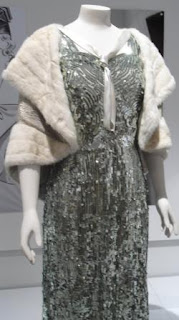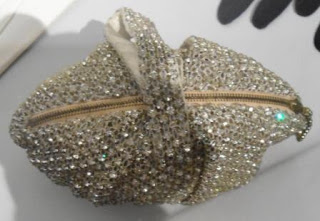This evening coat is made from silk velvet and angora rabbit
fur. It was bought from George Henry Lee & Co, Liverpool about 1930-36 by
Mrs Emily Tinne, a Liverpool lady with a great love of fashion.
This evening
dress made from rayon jersey, about 1938-40.
Fitted
and draped dresses were especially fashionable during the 1930s . The separate
pattern pieces were cut out of the fabric on a diagonal to the direction of the
threads. This was known as bias-cutting. It gave the dress pieces stretch so
that they could be closely moulded to the body’s shape when the garment was sewn together.
This evening dress is made from cotton net and metallic sequins
in about 1935. The shoulder cape worn with it, is made from silver lame and
rabbit fur and was made in the 1930s.
Sequinned dresses were fashionable throughout the 1920s and
1930s.
An evening dress made from silk velvet in about 1939-40.
During
the late 1930s, evening dresses with padded shoulders were especially
fashionable. The wide shoulder-line was exaggerated further by a nipped-in waist
and padded hips, resulting a v-shaped bodice. The film star Joan Crawford often
wore dresses in this style, which were widely copied.
During the 1930s, long gloves of fine black or white leather
were often worn with evening dresses. Evening bags were small and could
sometimes be attached to the owner’s wrist with a strap or short chain.
This is the last installment of the posts about the exhibition, Putting on the Glitz. I hope you've enjoyed seeing the beautiful frocks and accessories as much as I did.
TTFN
Louise
Click on the links below to see the first two posts.
















amazing gowns Louise but I honestly don't think I could ever be comfortable wearing one. You can bet your life I would dribble coffee down the front!!
ReplyDeleteMe too!
DeleteSwoonsville! X
ReplyDelete